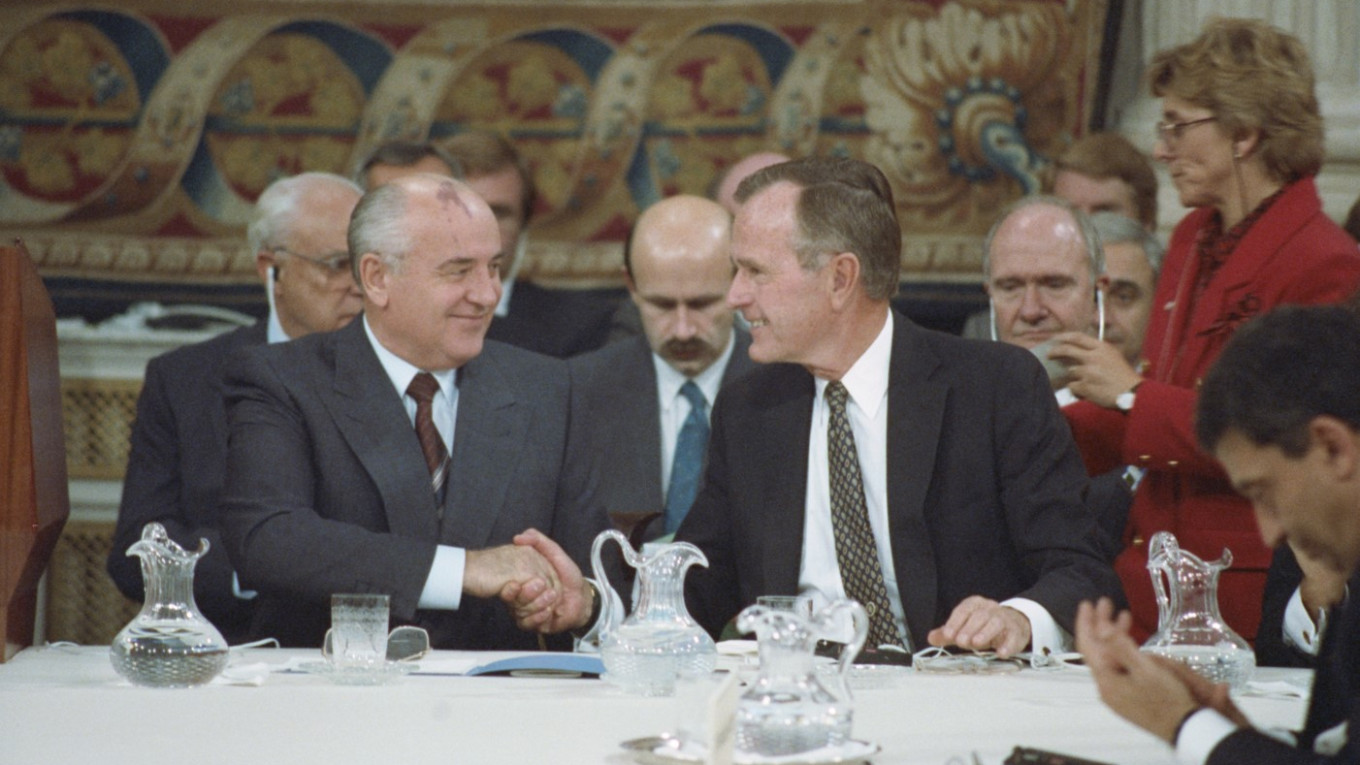Mary E. Sarotte’s book “Not One Inch: America, Russia, and the Making of Post-Cold War Stalemate” is the history of negotiations on arms control, security issues and NATO conducted by the leaders of the U.S., the Soviet Union and Russia, and the broader Western community from the beginning of Mikhail Gorbachev’s perestroika up through the rule of Boris Yeltsin. Thirty years later, as Russia is waging war in Ukraine, NATO is accepting new members, and many of the achievements of this period — free movement in Europe, increased trade and industrial development between East and West, and fewer nuclear weapons — are gone or in peril, the questions that underlie Sarotte’s work are urgent.
“Why did the United States decide to enlarge NATO after the Cold War, how did the American decision interact with contemporary Russian choices, and did that interaction yield the fateful decline in relations between the two countries?” she asks. “Were there feasible alternatives to the decisions that they made? What was the cost of expansion as it occurred, and how did it help to shape the era between the Cold War and COVID? Finally, how can knowledge of this history guide efforts to create a better future?”
Sarotte narrates this history in three main sections that cover the years from 1989 to 1999, with a final chapter returning to her original questions and a rich section of detailed, enormously valuable footnotes. Relying on meeting notes and reports written at the time, books, memoirs, more than 100 personal interviews, and reams of primary and secondary sources in several languages, “Not One Inch” lays out in extraordinary vivid detail how the political and security relations that had been in place for decades were negotiated away in less than ten years.
The title of the book is taken from Russian President Vladimir Putin’s accusation that the U.S. is guilty of reneging on the promise that NATO would not move “one inch” to the East.
The phrase, it turns out, was not a pledge but something of a rhetorical device during negotiations. In February 1990 James Baker, the U.S. secretary of state, asked Mikhail Gorbachev, the president of the U.S.S.R., “Would you prefer to see a unified Germany outside of NATO, independent and with no US forces or would you prefer a unified Germany to be tied to NATO, with assurances that NATO’s jurisdiction would not shift one inch eastward from its present position?” Negotiations moved on, and this was never codified in any agreement or treaty.

That is not to say that this implied and other promises, stated or unstated, were not broken by the American and Western side. But the U.S. wasn’t always the guilty party, although it was sometimes on the wrong side of history. Sarotte relates how the U.S. feared the dissolution of the Soviet Union and put great efforts into “shoring up Gorbachev and maintaining central authority.” American leaders did not support Boris Yeltsin until they had to form a relationship with him after the fall of the Soviet Union.
After Russia's invasion of Ukraine on Feb. 24, it is impossible to read "Not One Inch" without trying to find the guilty party or locate the moment when history might have taken a different turn. But, alas, Sarotte's book shows that that there were legions of guilty parties in dozens of countries and hundreds of moments when history might have been changed for the better.
Not One Inch: America, Russia, and the Making of Post-Cold War Stalemate

From Chapter Four: Oblivion and Opportunity
Yeltsin Makes the Soviet Union Obsolete
By autumn 1991, the NSC had concluded that the chances of “a long-term role for Gorbachev” were “nil.” Scowcroft started referring to “the collapse of the Soviet Union” in October 1991 as if it were an accomplished fact. Looking back on that time from the year 2000, he explained, “what became clear to me was that Yeltsin was maneuvering so that the Ukraine would be the proximate cause of the breakup of the Soviet Union.” But the real reason was the Russian leader’s cunning in using that country’s desire for independence as an excuse for what he wanted to do anyway. Put differently, “the Soviet Union was disintegrating,” Scowcroft believed, “almost completely because it was the way Yeltsin could get rid of Gorbachev”— by making the latter man into the leader “of a political entity that no longer existed.” The national security advisor realized that “the forces of disintegration were pretty strong,” but speculated that “if there had not been that enmity” between Yeltsin and Gorbachev, “I think there still could have been some kind of a Soviet Union today.”
That enmity was very real, however, and so in October 1991 Scowcroft began assessing what Soviet disintegration meant for NATO’s future, not least because Central and Eastern European leaders were now openly trying to flee into the alliance’s arms. Havel renewed his request to Bush for “some form of associate membership” in NATO. That request, Scowcroft thought, confirmed that “the failed coup brought NATO’s role vis-à-vis the East front and center.” He reminded Bush that “both within the Alliance and within your Administration we have been debating the merits of expanding NATO membership.” Now the pros and cons were becoming clearer. Pro was that NATO needed to grow or else risk becoming “increasingly irrelevant to a changing Europe”; con was that expansion risked “diluting NATO’s structures and patterns of cooperation on common defense.” Another factor was the thinking in Paris: “The French are reluctant to see the EC expand eastward and have opposed a NATO expansion eastward as well.” After considering the matter carefully, Scowcroft felt con was more convincing. He advised informing Secretary General Wörner, visiting in October, that “we did not feel the time ripe to extend NATO’s security guarantees eastward.”
Wörner, by contrast, felt there was a need “to upgrade NATO’s relations with the nations of Central and Eastern Europe” in some way. Aides to Baker and the German foreign minister, Hans-Dietrich Genscher, jointly proposed an upgrade short of expansion, namely, some kind of NATO-affiliated organization that Central and Eastern European states could join. The idea was to give those states a new, NATO-adjacent opportunity while avoiding the tricky question of membership in the alliance itself; Mitterrand had hoped his proposed confederation could do the same for the EC. The NSC agreed with this idea, adding that the new Baker-Genscher organization “should leave open the possibility of membership in NATO” so as not to appear to be “a permanent second class waiting room.” In the meantime, US policy would calibrate expanded ties to the actual degree of “democratization” in each country.
Discussing the Baker-Genscher upgrade with Wörner on October 11, 1991, Bush asked if its set of potential members should “include the Baltics.” The United States had never recognized de jure Soviet takeover of Estonia, Latvia, and Lithuania. But those three states had de facto come under Moscow’s domination, so admitting them would be a dramatic slap in the face of the still-extant Soviet Union. Wörner replied, “yes, if the Baltics apply they should be welcomed.” In fact he was already in contact with them; the president of Lithuania, Vytautas Landsbergis, “wanted to come see me at NATO, but because I am here today the Vice President of Lithuania” was in Brussels with subordinates instead. It was a sign of just how dramatically the Soviet collapse was expanding NATO’s opportunities.
With Bush’s support, Wörner returned to Brussels to turn the Baker-Genscher initiative into an organization. The July 1990 NATO summit had rhetorically offered a “hand of friendship” to former enemies. Now, a new North Atlantic Cooperation Council (NACC) was to turn that rhetoric into a reality by becoming a forum for dialogue and cooperation. To achieve this goal, the secretary general worked closely with the US Mission to NATO; all agreed the new organization should focus on the former Warsaw Pact states “plus the Baltics.”
The policy made good sense. It began to open doors to Central and Eastern Europe, but not in a way that obviously antagonized Moscow. How exactly joining the NACC would affect the prospect of any given state joining the alliance itself was left open, and that ambiguity was an asset. As the US Mission to NATO noted, it “was not practicable or desirable to define precisely an exact division of labor among NATO, the EC, and CSCE at this point.” Furthering the ambiguity, Wörner got the allies to agree on a so-called nondifferentiated approach for processing NACC applications— meaning that applications from Soviet republics would receive the same treatment as those from former Warsaw Pact countries. While obviously not welcome news in Central and Eastern Europe, such an approach helped avoid drawing a new line across Europe between more eligible and less eligible regions. Finally, a plan emerged to announce the new council at a NATO summit in November 1991, with the NACC convening its first full session in December.
There was a rub, however. Would Ukraine be welcome in the NACC as well? What if it asked for a NATO liaison office in Kiev? A shift of Ukraine’s loyalties away from Moscow and toward the West during such a tumultuous period as 1991, even in such seemingly minor ways as expressing interest in the NACC, would have far-reaching impacts.
With roughly 52 million inhabitants at the time, Ukraine was, in population terms, both the second-largest Soviet republic and the size of a major European state; the British and French populations were 57 and 58 million, respectively. Ukraine’s history as an East Slavic and predominantly Orthodox state had long been deeply intertwined with Russia’s. There were millions of ethnic Russians living among, and married to, Ukrainians. If Ukraine decided in its referendum of December 1, 1991 to become fully independent, it would at once commence a painful economic and political divorce from its fellow Slavs and also become a greater nuclear power than either Britain or France. Ukraine’s choices would clearly have such far-reaching effects. From Moscow, Ambassador Strauss advised Washington that “the most revolutionary event of 1991 for Russia may not be the collapse of Communism, but the loss of something Russians of all political stripes think of as part of their own body politic, and near to the heart at that: Ukraine.”
In short, the question of what to do about potential Ukrainian interest in NATO was fraught with significance; it was, in a way, a question about where Europe ended in the East. There was also an enormous practical problem: Gorbachev was furiously trying to stop Bush from dealing directly with Kiev. As a descendant of both Russians and Ukrainians, he was doing his utmost to prevent his ancestral lands from parting ways. The Soviet leader claimed, as part of that effort, that Ukraine in its current borders would be an unstable construct if it broke away. He told Bush that it had come into existence only because local Bolsheviks had at one point gerrymandered it that way to ensure their own power. They had “added Kharkov and Donbass,” and Khrushchev later “passed the Crimea from Russia to the Ukraine as a fraternal gesture.” Now, however, Kiev’s talk about independence was causing resistance in just those heavily pro-Russian regions, which Gorbachev intimated would rebel against any attempt at independence. Because of all of these concerns, an internal Bush administration “Draft Options Paper” on policy toward the region recommended exploring “the possibility of Ukraine joining the NATO liaison program at a later time.”
But the issue would not rest. The future of Ukraine caused controversy when Bush received Gorbachev’s advisor, Alexander Yakovlev, on November 19, 1991. Focused as ever on nuclear weapons, Bush asked about plans for the estimated 25 percent of the Soviet nuclear arsenal that was outside of Russia, particularly the weapons in Ukraine. Yakovlev replied, “of course, we won’t give up our weapons. They’re guarded by central authorities.” When Baker pointed out that guards might not remain loyal to Moscow, noting “some troops have moved over to the republics,” Yakovlev dismissed the concern: “I know some of the colonels may talk very demonstratively,” but “this doesn’t mean they actually will act as they talk.” Baker pressed the point again, wondering if there would be open conflict between Russia and Ukraine once they separated. Yakovlev, skeptical, responded that there were 12 million Russians in Ukraine, with “many in mixed marriages,” so “what sort of war could that be?” Baker answered simply: “a normal war.”
Excerpted from “Not One Inch: America, Russia and the Making of Post-Cold War Stalemate,” by Mary E. Sarotte, published by Yale University Press. Copyright © 2021 by M. E. Sarotte. Used by permission. All rights reserved. Footnotes have been removed to ease reading. For more information about the author and this book, see the publisher’s site here.
“Not One Inch: America, Russia and the Making of Post-Cold War Stalemate” has been shortlisted for the 2022 Pushkin House Book Prize.
A Message from The Moscow Times:
Dear readers,
We are facing unprecedented challenges. Russia's Prosecutor General's Office has designated The Moscow Times as an "undesirable" organization, criminalizing our work and putting our staff at risk of prosecution. This follows our earlier unjust labeling as a "foreign agent."
These actions are direct attempts to silence independent journalism in Russia. The authorities claim our work "discredits the decisions of the Russian leadership." We see things differently: we strive to provide accurate, unbiased reporting on Russia.
We, the journalists of The Moscow Times, refuse to be silenced. But to continue our work, we need your help.
Your support, no matter how small, makes a world of difference. If you can, please support us monthly starting from just $2. It's quick to set up, and every contribution makes a significant impact.
By supporting The Moscow Times, you're defending open, independent journalism in the face of repression. Thank you for standing with us.
Remind me later.







